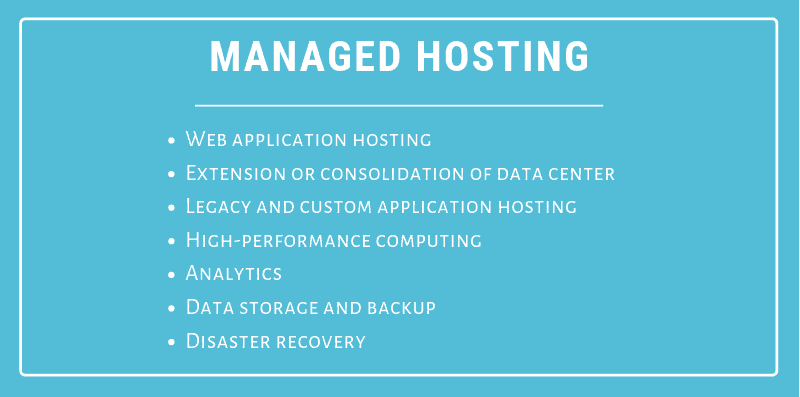What is Managed Hosting? Top Benefits For Every Business
The cost to buy and maintain server hardware for securely storing corporate data can be high. Find out what managed hosting is and how it can work for your business.
Maintaining servers is not only expensive but time and space exhaustive. Web Hosting Solutions exist to scale costs as your business grows. As the underlying infrastructure that supports IT expands, you’ll need to plan for that and find a solution that caters to increasing demands.
How? Read on, and discover how your organization can benefit from working with a managed services provider.
Managed Server Hosting Defined
Managed IT hosting is a service model where customers rent managed hardware from an MSP or 'managed service provider'. This service is also called managed dedicated hosting or single-tenant hosting. The MSP leases servers, storage, and a network dedicated environment to just one client. An option for those who want to migrate their infrastructure to the cloud.
There are no shared environments, such as networking or local storage. Clients that opt for managed server hosting receive dedicated monitoring services and operational management, which means the MSP handles all the administration, management, and support of the infrastructure. It’s all located in a data center which is owned and run by the provider, instead of being located with the client. This feature is especially crucial for a company that has to guarantee information security to its clients.
The main advantage of using managed IT services is that it allows businesses the freedom to not worry about their server maintenance. As technology continues to develop, companies are finding that by outsourcing day-to-day infrastructure and hardware vendor management, they gain value for money since they do not have to manage it in-house.
The MSP guarantees support to the client for the underlying infrastructure and maintains it. Additionally, it provides a convenient web-interface allowing the client to access their information and data, without fear of data loss or jeopardizing security.
Why Work With a Managed Hosting Provider
Any business that wants to secure and store their data safely, can benefit from managed hosting. Managed services are a good solution to cutting costs and raising efficiency for companies that need:

Network interruptions and server malfunctions cost companies in terms of real-time productivity. Whenever a hardware or performance issues occur you may be at risk of downtime. As you lose time, you inevitably lose money. Especially if you do a portion of your business online.
A survey by CA Technologies revealed just how much impact downtime can have on annual revenues. One of the key findings reported that each year North American businesses are collectively losing $26.5 billion due to IT downtime and recovery alone.
Researchers explained that most of the financial damage could have been avoided with better recovery strategies and data protection.
What are the Benefits of a Managed Host?
Backup and Disaster Recovery
The number one benefit of hiring an MSP is getting uninterrupted service. They work while you rest. Any problems that may arise are handled on the backend, far away from you and your customer base and rarely become customer-facing issues. Redundant servers, network protection, automated backup solutions, and other server configurations all work together to remove the stress from running your business.
Ability To Scale
Managed hosting also you to scale and plan more effectively. You spend less money for more expertise. Instead of employing a team of technicians, you ‘rent’ experienced and skilled experts from the data center, who are assigned according to your requirements. Additionally, you have the benefit of predicting yearly costs for hardware maintenance, according to the configuration chosen.
Increased Security
Managed web hosting services also protects you against cyber attacks by backing up your service states, encrypting your information, and quarantining your data flow. Today’s hackers use automation, AI, computer threading, and many other technologies. To counter this in-house, you would have to spend tens of thousands. The managed hosting service allows you to pay a fraction of this for exponentially more protection.
Redundancy and security increase as you move up service levels. At the highest levels, security on a managed hosting provider is virtually impenetrable.
Lower Operating Costs
One of the biggest benefits of moving to managed hosting is simply that you will be able to significantly reduce the costs of maintaining hardware in-house. Not only will you get to use the infrastructure of the MSP, but also access the expertise of their engineers.
They provide server configuration, storage, and networking requirements. They ensure the maintenance of complex tools, the operating system, and applications that are run on top of the infrastructure. They provide technical support, patching, hardware replacement, security, disaster recovery, firewalls all at a fee that greatly undercuts the costs of having to do it alone. The MSP provisions everything, allowing you to allot budget to other areas of your business.
Hosted vs Managed Services
The difference between owned versus leased or licensed hardware and software assets and hosting services is quantifiable.
Each business must do its own assessment of what will work best. Managed service providers encourage their clients to weigh both the pros and the cons. They will also help create personalized plans that suit specific business needs. This plan would reflect the risks, demands and financial plans an enterprise needs to consider before migrating to the cloud.
Typically there are three (3) conventional managed plans to choose from:
- The Basic package
- The Advanced package
- The Custom package
The basic package provides server and network management capabilities, assistance and support when needed, and periodical performance statistics.
The advanced package would offer fully managed servers, proactive troubleshooting, availability monitoring, and faster meaningful response.
The custom package is recommended for best for business solutions. It includes all advanced features with additional custom work time.
It is essential to note that each plan is implemented differently, tailored to the client individually.

Future of Managed Server Hosting
In 2010, the market size for cloud computing and hosting was $24.63 billion. In 2018, it was $117.96 billion. By 2020, some experts predict it will eclipse the $340 billion mark. The market has been growing exponentially for a decade now. It doesn’t look like it will slow down any time soon.
What has stimulated such a flourishing market over the years, is the ability to scale. When you invest in managed hosting services, you are sharing the cost of setup, maintenance, and security with thousands of other businesses across the world. Hence, companies enjoy greater security benefits than what could be procured by one company alone. The advantages are simply mathematical. Splitting costs saves your business capital.
Every company looking to compete and exist online should be aware of the importance of keeping its data secure and available.
It is now virtually impossible to maintain a fully secure server and management center in-house. Managed dedicated hosting services makes this available to you immediately and at a reasonable cost, since it scales with you. You pay only for what you need. And you have a set of experts to hold accountable for service misfires.
Hosting Solution That Grows With You
Web servers have more resources than ever. Web hosts have more power than ever too. What does this mean for you? Why does managed hosting with an MSP work? It’s because they offer a faster and more reliable service! Although, you will need to partner with a team that knows how to access this power.
Ready to Try a Managed Host?
Take the opportunity now and let us help you determine if managed hosting or one of our other cloud platforms is a good fit for your business? Find out how we can make the cloud work for you.